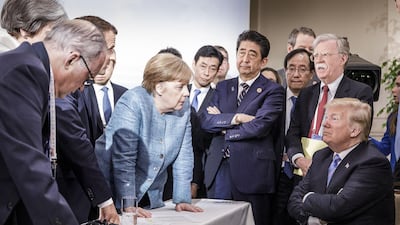Sometimes summitry is best captured in satire. Ahead of today's Singapore meeting between Donald Trump and Kim Jong-un, there was dulcet mood music and nakedly transparent attempts by two volatile, very alpha male leaders to court each other.
And then there was the grouchy summit in Canada of the G7 advanced economies. Mr Trump got into a terrible temper with America's closest allies and was especially insulting about the G7 summit host, Canada's Prime Minister Justin Trudeau.
Yet he departed Canada for Singapore with the ironic declaration that he was on “a mission for peace”. Cue satirist Andy Borowitz and his newest offering. The North Korean dictator, Mr Borowitz deadpanned, “has offered to host peace talks between the United States and Canada (because) the rising tensions between the North American neighbours were posing an ‘intolerable threat to world peace’”.
It would be rip-roaringly funny if it didn’t seem achingly, ever so slightly true. But then, as America’s celebrated political humourist Art Buchwald once said of his craft: “You can't make up anything anymore. The world itself is a satire. All you're doing is recording it.”
Mr Buchwald was at the height of his talents in the 1970s and it is somewhat reassuring that his words ring true today. In 2018, the world itself seems a satire and all that Mr Borowitz, television comedy hosts and other jesters in the court of Washington and elsewhere can do is to record it.
It is best left to the professionals. There was an element of slightly overdone satire in the German government's decision to release a G7 summit shot by its official photographer Jesco Denzel. It showed a perplexed Chancellor Angela Merkel staring down at Mr Trump, who sat arms crossed and immovable, while the rest of the G7 summit collective and some of their aides stood around, metaphorically wringing their hands.
The subtext was obviously the fractiousness introduced by Mr Trump into a meeting that has occurred every year since 1975 to discuss western economic policy and reaffirm shared principles. But if it cast Mr Trump in an unflattering light, it also showed the other G7 leaders as seemingly powerless, reduced to vainly pleading for American favour.
One had to wonder about the purpose of releasing the photograph. Was it meant to show the collective strength in exasperation of the rest of the West versus America? Was it supposed to inspire admiration for Ms Merkel’s steely self-command despite her obvious irritation at Mr Trump’s disruptive behaviour? Or was it meant to be a mocking take on Mr Trump’s rock-like imperturbability in the face of hard facts on trade?
Though the photograph went viral on social media and earned the overused label “iconic”, its release was criticised by Norbert Rottgen, chairman of the German parliament’s foreign affairs committee and a member of Ms Merkel’s center-right Christian Democratic Union. In a statement that is a fine piece of unintentional satire in itself because it suggests the current president of the United States is a contrarian scamp, Mr Rottgen said: “By portraying [Mr Trump] as the naughty boy in the room, he will stick even more to his behaviour and it will get worse. We have to ignore his behaviour and concentrate on what is left of the substance of the transatlantic relationship.”
That is a serious point and is ripe for futurist satire. Mr Trump has made clear that at least during his presidency, the United States will use coercive transactionalism in all matters of foreign policy, whether they involve allies or adversaries.
In this respect, Trump’s America will be an equal opportunities offender, discriminating not at all between long-time friends and long-loathed foes; acknowledging no distinction between alliances of values and deals that deliver temporary dividends in trade, trademarks and photo opportunities.
In the words of Peter Westmacott, a former British ambassador to Washington: “Trump is readier to give a pass to countries that pose a real threat to western values and security than to America’s traditional allies.”
There is an egalitarian spirit about it, a sense of seizing opportunities where and when they arise, rather than being weighed down by conscience and history. Satirists could have a lot of fun with recording this moment as it is – Mr Trump re-making the free market as truly free, of all values. Everyone technically has the chance to buy in and previous offences are not disqualifying.
But as things stand, there is more focused bitterness than satire about the US president’s disregard for 70 years of the global institutional architecture America has carefully constructed and maintained. That is right and proper too. Satire is superb when it points to problems that need to acknowledged and fixed. The problem arises when the satirists are endlessly entertaining but the politicians are able to do little more than provide them material.
Rashmee Roshan Lall is a commentator on world affairs and is currently working on a doctorate in the UK


